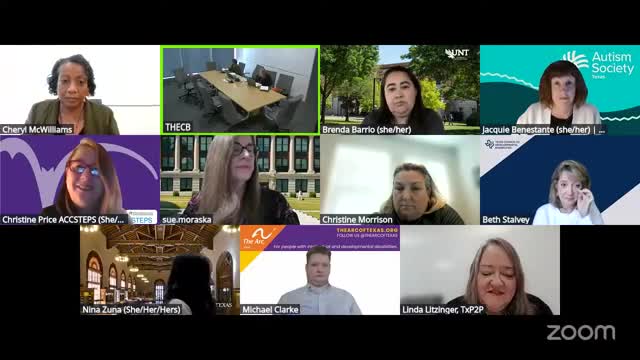THECB advisory committee reviews state of postsecondary supports for students with IDD, plans SB55 report
Get AI-powered insights, summaries, and transcripts
Subscribe
Summary
The Higher Education Coordinating Board( THECB ) IDD Advisory Committee heard a presentation from Bloom Consulting, reviewed national and Texas program examples, and examined new THECB enrollment data as members organized subcommittees to produce recommendations required by Senate Bill 55.
The Higher Education Coordinating Board( THECB ) IDD Advisory Committee met Jan. 24 by videoconference and moved forward on the body—s work to implement Senate Bill 55, hearing from an external provider about campus coaching services, reviewing a bibliography of best-practice programs, and discussing newly received enrollment data for students with intellectual and other developmental disabilities (IDD) and autism spectrum disorder (ASD).
The committee—s charge under Senate Bill 55 (88th Legislature) is to identify best practices and program modules from public and private institutions outside Texas and recommend which elements could be replicated or extended in Texas. At the Jan. 24 meeting, committee members organized subcommittees on best practices, K—postsecondary alignment (TPA), and data; discussed scholarship and funding sources; and agreed on next steps and a timeline aimed at producing a rough draft of the SB55 report by early April.
"When I started with Bloom, we had 60 students in the state of Texas," said Christine Morrison, campus-connections coordinator at Bloom Consulting, who described the coaching, academic supports and employment follow-up her organization provides. Morrison said Bloom—s Texas contract ended and current Texas students now participate on a private-pay basis; Bloom continues to serve students in other states, including Nevada. "We have a very fluid relationship with our students because there are so many different needs that show up when one of our students is in school," she said.
Morrison and committee members described practical supports that help students stay enrolled: regular coaching on time management and syllabus review, assistance with offices such as financial aid and the registrar, help with accommodations at disability-resource centers, and social-skills supports. Morrison also noted a persistent challenge placing graduates into employment and described efforts to help alumni with job searches.
Members highlighted several Texas and national models to study. Committee materials referenced Think College and the National Clearinghouse on Autism, as well as program examples and news coverage from institutions including Austin Community College, Houston Community College (HCC), Dallas College, University of North Texas (UNT) and UNT—s Elavar and Engage initiatives. Several members described local pilots to expand success coaches, peer mentoring, and resource centers funded through grants such as the Moody Foundation.
The THECB staff shared newly received enrollment data that committee members said will inform the SB55 report. According to the slides discussed at the meeting, total enrollment of students coded as ASD/IDD in THECB data rose from about 4,253 in 2021 to 6,182 in 2024. THECB noted a 36% increase in enrollment between 2022 and 2024. Among enrolled students, the data shown to the committee said white students constituted the largest single ethnic group, followed by Hispanic and Black students; the share of Hispanic students rose during the period. THECB—s slides showed slightly more female than male students in 2024, that more than half of enrolled students were older than 21 (though that share was decreasing), and that most students were part-time (fewer than 12 credit hours).
Members raised data-quality questions and reporting gaps. Several committee participants said some institutions report only credit-bearing enrollments to THECB, while many campus IDD/ASD programs operate as noncredit, continuing-education offerings; others noted that students with an ASD diagnosis are often not identified or do not self-identify at college, which can reduce counts derived from institutional disability-service records. Committee co-chairs said they will work with THECB data staff and campus registrars to clarify methodology and collect any additional reports (credit and noncredit) needed for the SB55 analysis.
Financial aid and scholarships for students with IDD/ASD were another focus. Members said many examples of institutional or local foundation scholarships are not visible on statewide lists and encouraged the committee to review foundations and campus development offices as a source of targeted aid. Programs noted as examples included the CTP (career and technical program) pathway that can make noncredit programs eligible for Pell and specific scholarships provided by local foundations (members cited the Assistance League of Houston and a new LIFT Foundation gift to HCC as examples) and national funds such as Ruby—s Rainbow.
Subcommittees reported progress and next steps. The best-practices subcommittee plans to identify 5— programs outside Texas for comparison; the TPA subcommittee is awaiting TEA—s forthcoming data on K—12 specialized autism grants (the committee was told TEA has compiled two years of outcomes from more than 60 LEA grantees and expects to release analyses soon); and the data subcommittee reported initial THECB figures but requested further clarification of definitions and reporting streams so the final SB55 report can reconcile credit and noncredit enrollments.
Committee chairs set a target for a rough draft of the SB55 report by the week of April 4 and asked subcommittees to meet regularly until then. THECB staff said they will circulate the bibliography and the slide packet discussed during the meeting and will coordinate follow-up with registrars and TEA as needed.
Votes at a glance: The committee approved the Oct. 22 meeting minutes by roll-call vote (motion by Christine Price; second by Brenda Barrio). Several members voted to approve; one member who had not attended the prior meeting abstained. The committee adopted a motion to adjourn (moved by Christine Price; seconded by Nina Zuna). Both motions passed.
The committee will reconvene as part of the SB55 process; subcommittees will gather program examples, interview outside programs when needed, and refine data requests so the April deadline for a draft is met.
(Reporting note: quotes and attributions in this article are drawn from the Jan. 24 THECB IDD Advisory Committee meeting transcript.)
